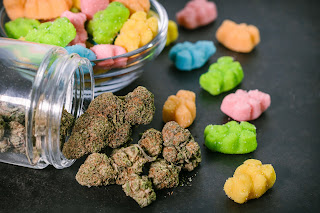As more and more states are legalizing marijuana, it makes it easier for kids to accidentally ingest tetrahydrocannabinol (THC) containing foods and candies, also known as edibles. Parents need to be diligent in keeping their kids safe from accidental exposure to edibles, especially gummies.
What are
THC edibles?
THC-infused
foods and candies are also known as marijuana edibles. They look very similar, if not identical, to common
everyday foods and candies you can find in any grocery or convenience store.
Some examples include:
· Gummy candies
· Chocolates & other sweet or tart
candies
· Cookies and other baked goods
· Lollipops
The primary
concern with THC-infused edibles is that they look and taste just like regular
foods and candies that don’t contain THC. People may not be able to tell the
difference in look or taste between regular items and those infused with marijuana
(THC).
Consuming high
amounts of THC can cause significant effects. Consuming any significant amount of THC can
cause undesirable effects. Some symptoms of these undesirable effects could
include:
· Altered perception
· Intoxicated state
· Anxiety
· Panic or paranoia
· Dizziness
It is
important to note that a recommended serving size (by the person or
manufacturer of the product) for edibles varies greatly by product and can at
times be as little as a portion of one piece. It is also important to note that there is no
recommended dose for a child as it is not legal in any state for children to
consume.
Edibles can
be potentially dangerous, especially to small children. The effects can be
delayed and sometimes take hours to appear.
People experimenting for the first time with THC containing edibles might
take more than is recommended, thinking they are not feeling the “effects”. This
can lead to potentially ingesting more than the recommended amount or enough to
cause undesirable effects. Call the poison center at 1-800-222-1222
if you have any questions or concerns about a potential poisoning from a THC-infused product.
For more
information on this topic and other poisoning concerns, visit www.poisoncontrol.org.

No comments:
Post a Comment